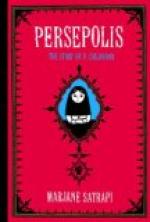The trail of Nello’s steps, faint and obscure as it was under the new snow, went straightly along the accustomed tracks into Antwerp. It was past midnight when Patrasche traced it over the boundaries of the town and into the narrow, tortuous, gloomy streets. It was all quite dark in the town, save where some light gleamed ruddily through the crevices of house-shutters, or some group went homeward with lanterns chanting drinking-songs. The streets were all white with ice: the high walls and roofs loomed black against them. There was scarce a sound save the riot of the winds down the passages as they tossed the creaking signs and shook the tall lamp-irons.
So many passers-by had trodden through and through the snow, so many diverse paths had crossed and re-crossed each other, that the dog had a hard task to retain any hold on the track he followed. But he kept on his way, though the cold pierced him to the bone, and the jagged ice cut his feet, and the hunger in his body gnawed like a rat’s teeth. He kept on his way, a poor gaunt, shivering thing, and by long patience traced the steps he loved into the very heart of the burgh and up to the steps of the great cathedral.
“He is gone to the things that he loved,” thought Patrasche: he could not understand, but he was full of sorrow and of pity for the art-passion that to him was so incomprehensible and yet so sacred.
The portals of the cathedral were unclosed after the midnight mass. Some heedlessness in the custodians, too eager to go home and feast or sleep, or too drowsy to know whether they turned the keys aright, had left one of the doors unlocked. By that accident the foot-falls Patrasche sought had passed through into the building, leaving the white marks of snow upon the dark stone floor. By that slender white thread, frozen as it fell, he was guided through the intense silence, through the immensity of the vaulted space,—guided straight to the gates of the chancel, and, stretched there upon the stones, he found Nello. He crept up and touched the face of the boy. “Didst thou dream that I should be faithless and forsake thee? I—a dog?” said that mute caress.
The lad raised himself with a low cry and clasped him close. “Let us lie down and die together,” he murmured. “Men have no need of us, and we are all alone.”
In answer, Patrasche crept closer yet, and laid his head upon the young boy’s breast. The great tears stood in his brown, sad eyes: not for himself,—for himself he was happy.
They lay close together in the piercing cold. The blasts that blew over the Flemish dikes from the northern seas were like waves of ice, which froze every living thing they touched. The interior of the immense vault of stone in which they were was even more bitterly chill than the snow-covered plains without. Now and then a bat moved in the shadows,—now and then a gleam of light came on the ranks of carven figures. Under the Rubens they lay together quite still, and soothed almost into a dreaming slumber by the numbing narcotic of the cold. Together they dreamed of the old glad days when they had chased each other through the flowering grasses of the summer meadows, or sat hidden in the tall bulrushes by the water’s side, watching the boats go seaward in the sun.




